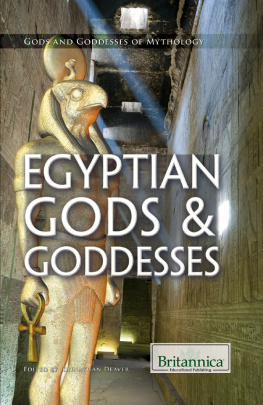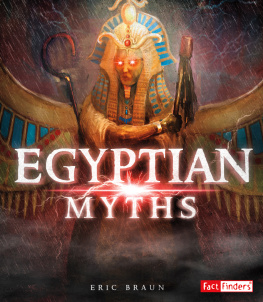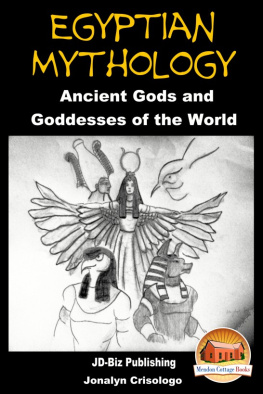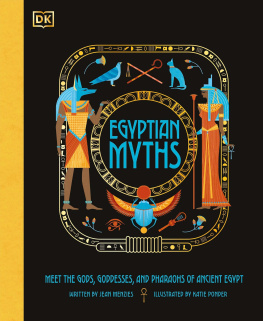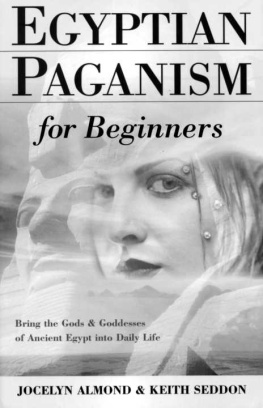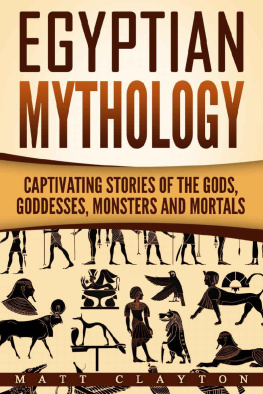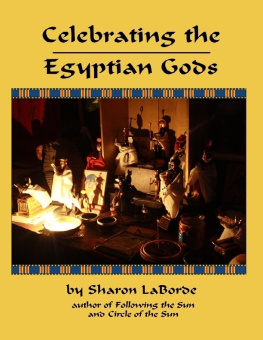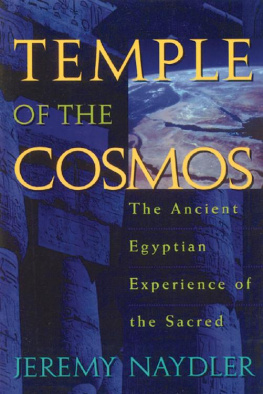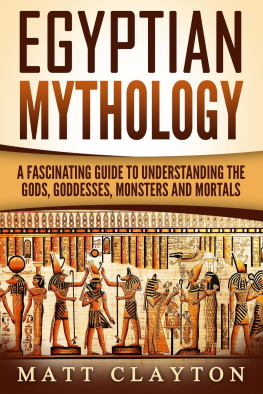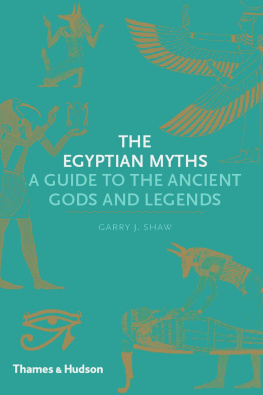

Published in 2014 by Britannica Educational Publishing (a trademark of Encyclopdia Britannica, Inc.) in association with The Rosen Publishing Group, Inc.
29 East 21st Street, New York, NY 10010
Copyright 2014 by Encyclopdia Britannica, Inc. Britannica, Encyclopdia Britannica, and the Thistle logo are registered trademarks of Encyclopdia Britannica, Inc. All rights reserved.
Rosen Publishing materials copyright 2014 The Rosen Publishing Group, Inc. All rights reserved.
Distributed exclusively by Rosen Publishing.
To see additional Britannica Educational Publishing titles, go to http://www.rosenpublishing.com.
First Edition
Britannica Educational Publishing
J. E. Luebering: Director, Core Reference Group
Anthony L. Green: Editor, Comptons by Britannica
Rosen Publishing
Hope Lourie Killcoyne: Executive Editor
Johnathan Deaver: Editor
Nelson S: Art Director
Brian Garvey: Designer
Cindy Reiman: Photography Manager
Cataloging-in-Publication Data
Egyptian gods & goddesses/edited by Johnathan Deaver.
pages cm. (Gods & goddesses of mythology)
Includes bibliographical references and index.
ISBN 978-1-62275-156-3 (eBook)
1. Gods, Egyptian. 2. Goddesses, Egyptian. 3. Mythology, Egyptian. 4. EgyptReligion. I. Deaver, Johnathan, editor of compilation. II. Title: Egyptian gods and goddesses.
BL2450.G6E39 2013
299.31211dc23
2013026995
On the cover: Composite image of a statue of the deity Horus inside a corridor in an Egyptian temple. YorkBerlin/Shutterstock.com (Horus statue), Paul Vinten/Shutterstock.com (temple interior)
Interior pages (hieroglyphics) Hulton Archive/Getty Images; back cover iStockphoto.com/DavidMSchrader
Contents
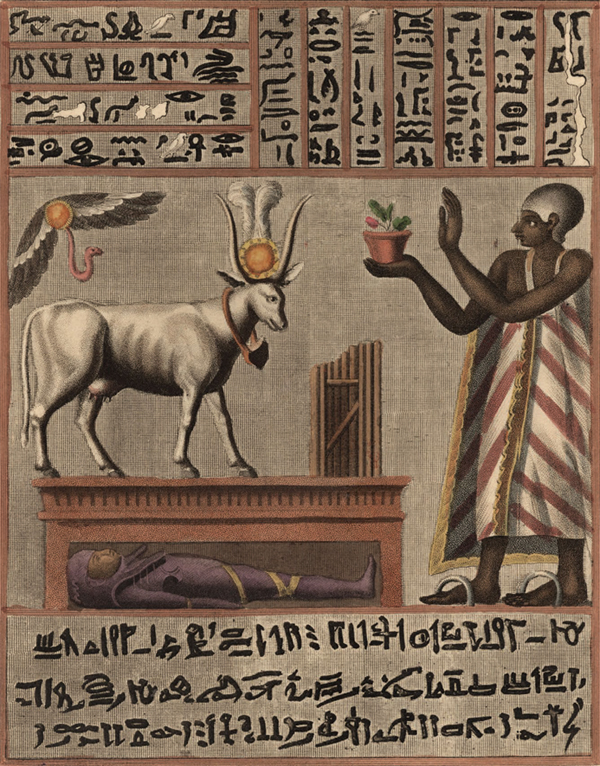
Hieroglyphics and images of ritualistic animals and objects adorn an Egyptian manuscript found among the swathing of a mummy. Hulton Archive/Getty Images
T he ancient Egyptian religion was very complex. It was also relatively untouched by outside influences for many centuries. Its most striking feature was the vast number of gods and goddesses who could be depicted in human, animal, or other forms. The gods were never grouped systematically, and many of them were therefore interchangeable.
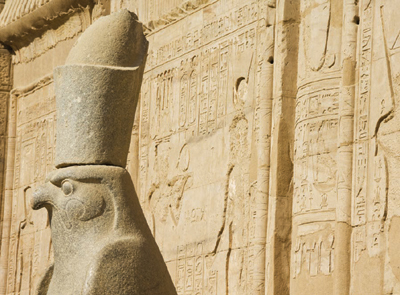
A statue of the Egyptian god Horus outside the sandstone Temple of Horus at Edfu, Egypt. MyLoupe/Universal Images Group/Getty Images
As they had different forms, the gods also personified different powers. Horus, a god in the form of a falcon, symbolized the sun and came to represent the pharaoh. Thoth, the moon god, was also the god of time because the phases of the moon were used to calculate the months. Powers of nature were symbolized by Re, the sun god; Nut, the sky goddess; and Geb, the Earth god. For a time Amenhotep IV made the sun, under the name Aton, the sole god. Anubis, in the form of a dog, was god of the dead, Ptah was the creator, and Min was a god of fertility. Other major gods and goddesses included Bast, goddess of music; Isis, queen of the gods, Maat, the goddess of law, justice, and truth; Nekhbet, the protector of childbirth; Osiris, a fertility god, giver of civilization, and ruler of the dead; Sekhmet, a warlike sun goddess; and Shu, the god of light and air who supported the sky.
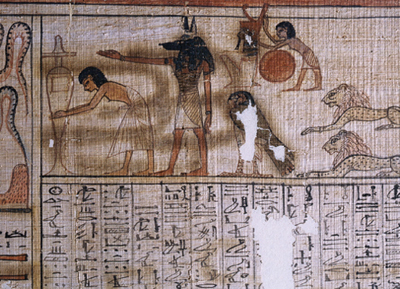
Papyrus from the Book of the Dead of Neferrenpet depicting a dead man with Anubis (second from left) and other gods of the underworld. Werner Forman/Universal Images Group/Getty Images
N ATURE AND S IGNIFICANCE
Egyptian religious beliefs and practices were closely integrated into Egyptian society of the historical period (from c. 3000 BCE ). Although there were probably many survivals from prehistory, these may be relatively unimportant for understanding later times because the transformation that established the Egyptian state created a new context for religion.
Religious phenomena were pervasive, so much so that it is not meaningful to view religion as a single entity that cohered as a system. Nevertheless, religion must be seen against a background of potentially nonreligious human activities and values. During its more than 3,000 years of development, Egyptian religion underwent significant changes of emphasis and practice, but in all periods religion had a clear consistency in character and style.
It is inappropriate to define religion narrowly, as consisting only in the cult of the gods and in human piety. Religious behaviour encompassed contact with the dead, practices such as divination and oracles, and magic, which mostly exploited divine instruments and associations.
There were two essential foci of public religion: the king and the gods. Both are among the most characteristic features of Egyptian civilization. The king had a unique status between humanity and the gods, partook in the world of the gods, and constructed great, religiously motivated funerary monuments for his afterlife. Egyptian gods are renowned for their wide variety of forms, including animal forms and mixed forms with an animal head on a human body. The most important deities were the sun god, who had several names and aspects and was associated with many supernatural beings in a solar cycle modeled on the alternation of night and day, and Osiris, the god of the dead and ruler of the underworld. With his consort, Isis, Osiris became dominant in many contexts during the 1st millennium BCE , when solar worship was in relative decline.
The Egyptians conceived of the cosmos as including the gods and the present worldwhose centre was, of course, Egyptand as being surrounded by the realm of disorder, from which order had arisen and to which it would finally revert. Disorder had to be kept at bay. The task of the king as the protagonist of human society was to retain the benevolence of the gods in maintaining order against disorder. This ultimately pessimistic view of the cosmos was associated principally with the sun god and the solar cycle. It formed a powerful legitimation of king and elite in their task of preserving order.
Despite this pessimism, the official presentation of the cosmos on the monuments was positive and optimistic, showing the king and the gods in perpetual reciprocity and harmony. This implied contrast reaffirmed the fragile order. The restricted character of the monuments was also fundamental to a system of decorum that defined what could be shown, in what way it could be shown, and in what context. Decorum and the affirmation of order reinforced each other.
These beliefs are known from monuments and documents created by and for the king and the small elite. The beliefs and practices of the rest of the people are poorly known. While there is no reason to believe that there was a radical opposition between the beliefs of the elite and those of others, this possibility cannot be ruled out.

